study help–Mastering Biology Chapter 8 – Flashcards
Unlock all answers in this set
Unlock answersquestion
Meiosis starts with a single diploid cell and produces
answer
four haploid cells
question
A cell preparing to undergo meiosis duplicates its chromosomes during
answer
interphase.
question
During prophase I of meiosis,
answer
homologous chromosomes stick together in pairs.
question
The correct order of events during meiosis is
answer
prophase I, metaphase I, anaphase I, telophase I, cytokinesis, meiosis II.
question
During meiosis, segments of nonsister chromatids can trade places. This recombination of maternal and paternal genetic material is a key feature of meiosis. During what phase of meiosis does recombination occur?
answer
prophase I.
question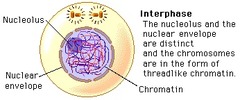
Nucleoli are present during _____.

answer
interphase
question
Cytokinesis often, but not always, accompanies _____.

answer
telophase (Cytokinesis often, but not always, accompanies telophase.)
question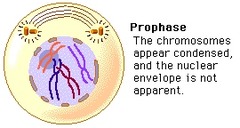
Chromosomes become visible during _____.

answer
prophase (The chromatin fibers become discrete chromosomes.)
question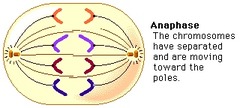
Centromeres divide and sister chromatids become full-fledged chromosomes during _____.

answer
anaphase (During anaphase, sister chromatids separate and daughter chromosomes migrate to opposite poles.)
question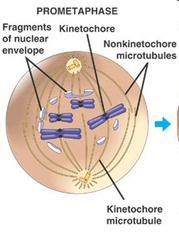
Spindle fibers attach to kinetochores during _____.

answer
prometaphase (Attachment of spindle fibers to kinetochores is one of the events of pro metaphase.)
question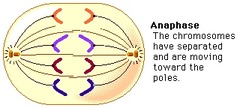
When the separate chromosomes are being pulled from one place to another? This animation illustrates the events of _____.

answer
Anaphase
question
In animal cells ______ involves the formation of a cleavage furrow
answer
Cytokinesis
question
Events of________ include the condensation of chromatin and the dispersal of nucleoli.
answer
Prophase
question
During _______ chromosomes align along the metaphase plate.
answer
Metaphase
question
The events of _________ include the attachment of spindle fibers to kinetochores.
answer
Prometaphase
question
_____ in plant cells involves the formation of a cell plate.
answer
Cytokinesis
question
During_______ both nuclear envelopes and nucleoli re-form.
answer
Telophase
question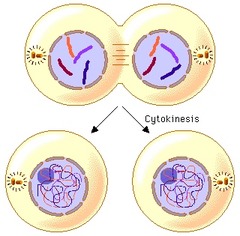
When a cleavage furrow appears and eventually pinch into 2 cells. This animation illustrates the events of _____.

answer
cytokinesis as it occurs in animal cells
question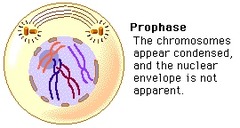
When the chromosomes become visible? This animation illustrates the events of _____.

answer
Prophase
question
When chromosomes align laterally (along the metaphase plate: imaginary line located midway between the poles of the duplicated chromosomes and the original chromosomes), before they separate. This animation illustrates the events of _____.
answer
Metaphase
question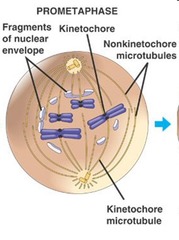
When the chromosomes break the nuclear envelope, and attach to microtubules. This animation illustrates the events of _____.

answer
prometaphase
question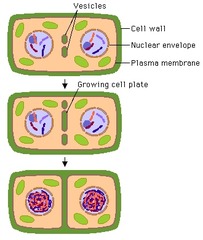
When a cell plate divides into 2 cells. This animation illustrates the events of _____.

answer
Cytokinesis as it occurs in Plant Cells
question
When the sister cells are completely divided through Cytokinesis. This animation illustrates the events of _____.

answer
telophase
question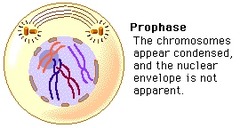
During prophase a homologous pair of chromosomes consists of _____.

answer
two chromosomes and four chromatids
question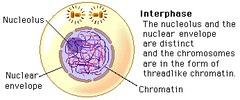
During _____ the cell grows and replicates both its organelles and its chromosomes.

answer
interphase
question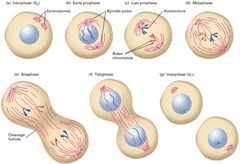
During _____ both the contents of the nucleus and the cytoplasm are divided.

answer
the mitotic phase (encompasses both mitosis and cytokinesis)
question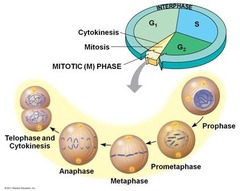
Which of these phases encompasses all of the stages of mitosis but no other events?

answer
Mitosis
question
DNA replication produces two identical DNA molecules, called _____, which separate during mitosis.
answer
sister chromatids
question
After chromosomes condense, the _____ is the region where the identical DNA molecules are most tightly attached to each other.

answer
centromeres
question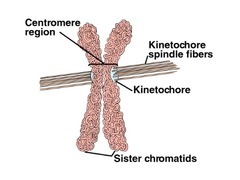
During mitosis, microtubules attach to chromosomes at the ______.

answer
kinetochores
question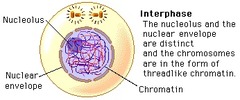
In dividing cells, most of the cell's growth occurs during ______.

answer
interphase
question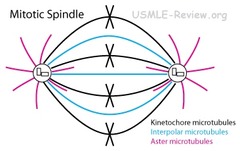
The _____ is a cell structure consisting of microtubules, which forms during early mitosis and plays a role in cell division.

answer
mitotic spindles
question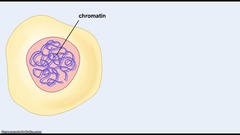
During interphase, most of the nucleus is filled with a complex of DNA and protein in a dispersed form called _____.

answer
chromatin
question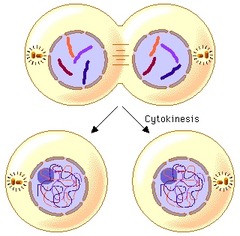
In most eukaryotes, division of the nucleus is followed by ______, when the rest of the cell divides.

answer
cytokinesis
question
The _____ are the organizing centers for microtubules involved in separating chromosomes during mitosis.
answer
centrosomes
question
The key structures involved in mitosis of an animal cell
answer
The two SISTER CHROMATIDS of each duplicated chromosome beginning to attach to the MITOTIC SPINDLE by means of their KINETOCHORES. The CENTROSOMES anchor the MIT at opposite ends of the cell. CENTROMERE is the region of the chromosome where chromatids are most closely attached to each other.
question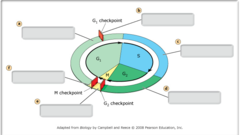
Cell Cycle Phases: Interphase consists of the G1, S, and G2 subphases, and that the M phase consists of mitosis and cytokinesis.

answer
A. Non dividing cells exit cell cycle B. At this point, cell commits to go through the cycle. C. DNA replicates D. Centrosome replicates E. Mitotic spindle begins to form. F. Cell divides, forming two daughter cells.
question
Phases of the cell cycle
answer
The first step in preparing for division is to replicate the cell's DNA in the S phase. In the G2 phase, the centrosome replicates. In early M phase, the centrosomes move away from each other toward the poles of the cell, in the process organizing the formation of the mitotic spindle. At the end of the M phase when mitosis is complete, the cell divides (cytokinesis), forming two genetically identical daughter cells.
question
Once a cell passes the ______ checkpoint, it usually completes the cell cycle--that is, it divides.
answer
G1
question
As the chromosomes of a parent cell are duplicated and distributed to the two daughter cells during cell division, the structure of the chromosomes changes.

answer
1. N Y Y Y N 2. N N N Y Y 3. N Y Y Y Y
question
Changes in DNA structure during the cell cycle:
answer
Sister chromatids form when DNA replicates in the S phase. The sister chromatids become individual chromosomes once they separate in early anaphase. Similarly, the cellular DNA content doubles in the S phase when the DNA replicates. However, the cell's DNA content does not return to its normal (undoubled) levels until after cytokinesis is complete and two daughter cells have formed. The condensation state of the DNA is not related to the presence or absence of sister chromatids. The DNA condenses in prophase and remains condensed until after the sister chromatids separate and the new daughter cells begin to form. In late telophase/cytokinesis, the emphasis shifts to cell growth and DNA replication for the next cell cycle. For these processes to occur, the DNA needs to be de-condensed so it is accessible to the cellular machinery involved in transcription.
question
In ______ the microtubules of the spindle apparatus begin to assemble from individual tubulin subunits. As the identical chromatids of each pair of sister chromatids condense during this stage, they are held together by cohesin proteins.
answer
Prophase
question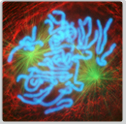
In_____ is marked by fragmentation of the nuclear envelope, expansion of the spindle into the nuclear region, and attachment of some spindle fibers to the chromosomes via the kinetochores.

answer
Prometaphase
question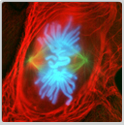
_________,marked by the alignment of chromsomes along the metaphase plate, is brought about by kinetochores aligning and then remaining motionless relative to the poles of the cell.

answer
Metaphase
question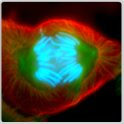
In ______ , the cohesin proteins are cleaved, and the kinetochores move toward the poles of the cell, separating the sister chromatids.

answer
Anaphase
question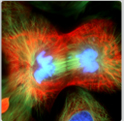
As _______ proceeds, the kinetochore microtubules of the spindle disassemble. As the chromosomes reach the poles of the cell, the nuclear envelopes of the two new daughter nuclei form.

answer
Telophase
question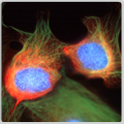
What phase is this?

answer
Cytokinesis
question
During prophase, the microtubules of the mitotic spindle ______.
answer
lengthen
question
During anaphase, the nonkinetochore microtubules ______ and move past each other, and the kinetochore microtubules ______.
answer
lengthen, shorten
question
During telophase, the non kinetochore microtubules ______.
answer
disassemble
question
Roles of the mitotic spindle
answer
1. Will this cell elongate during mitosis? (yes) 2. Will the sister chromatids separate from each other? (yes) 3. Will the chromosomes move to the poles of the cell? (no)
question
Comparing chromosome separation in bacteria and eukaryotes
answer
bacteria only: *Chromosome separation begins at the origin of replication on DNA. Eukaryotes only: * Before separation, duplicated chromosomes condense. * Nuclear envelope fragments, permitting chromosome separation. * 2 copies of the duplicated chromosome are attached at their centromeres before separation. Both Bacteria and Eukariotes: * Chromosomes replicate before cell division. * Replicated chromosomes separate by attaching to some other structural feature of the cell.
question
Cytokinesis in plant cells
answer
*Vesicles from the Golgi apparatus move along microtubules, coalesce at the plane of cell division, and form a cell plate. *The cell plate consists of the plasma membrane and cell wall that will eventually separate the two daughter cells.
question
Why is it difficult to observe individual chromosomes with a light microscope during interphase?
answer
They have uncoiled to form long, thin strands.
question
Kinetochores
answer
They are sites at which microtubules attach to chromosomes.
question
Cytochalasin B is a chemical that disrupts microfilament formation. How would this interfere with cell division?
answer
cleavage
question
In some organisms, such as certain fungi and algae, cells undergo the cell cycle repeatedly without subsequently undergoing cytokinesis. What would result from this?
answer
large cells containing many nuclei
question
Cells divide by constriction of a ring of proteins
answer
bacteria: TRUE animals: TRUE plants: FALSE
question
The presence of a cell wall prevents the cell from dividing by constriction
answer
bacteria: FALSE animals: FALSE plants: TRUE
question
Tubulin or tubulin-like molecules function in binary fission (in bacteria) or cytokinesis (in animals and plants).
answer
bacteria: TRUE animals: FALSE plants: TRUE
question
Cells will usually divide if they receive the proper signal at a checkpoint in which phase of the cell cycle?
answer
G1
question
_____ is a carcinogen that promotes colon cancer.
answer
Fat (A diet high in fat increases the risk of both colon and breast cancer.)
question
Carcinogens
answer
cigarette smoke testosterone UV light Fat (All of these substances can cause cancer.)
question
One difference between cancer cells and normal cells is that cancer cells
answer
continue to divide even when they are tightly packed together.
question
The decline of MPF activity at the end of mitosis is due to
answer
the degradation of cyclin.
question
Vinblastine is a standard chemotherapeutic drug used to treat cancer. Because it interferes with the assembly of micro-tubules, its effectiveness must be related to
answer
disruption of mitotic spindle formation.
question
The drug cytochalasin B blocks the function of actin. Which of the following aspects of the animal cell cycle would be most disrupted by cytochalasin B?
answer
cleavage furrow formation and cytokinesis
question
How do cancer cells differ from normal cells?
answer
Cancer cells may be immortal.



